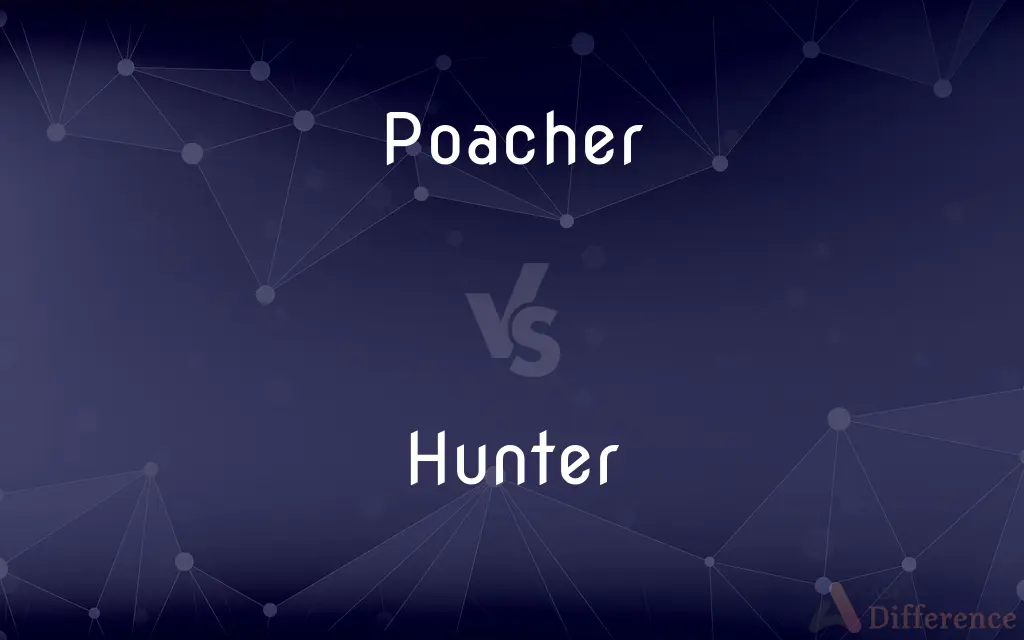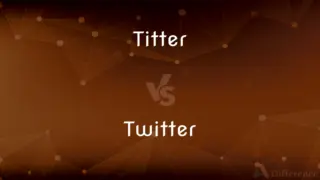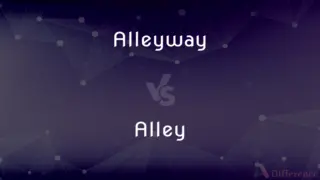Poacher vs. Hunter — What's the Difference?
Edited by Tayyaba Rehman — By Urooj Arif — Updated on March 19, 2024
A poacher illegally hunts or captures wildlife, violating local or international laws, while a hunter engages in the legal, regulated pursuit of game for sport or sustenance.

Difference Between Poacher and Hunter
Table of Contents
ADVERTISEMENT
Key Differences
Poachers operate outside the law, often targeting protected or endangered species, and their actions can have devastating effects on local ecosystems and wildlife populations. In contrast, hunters typically follow legal guidelines set by wildlife conservation laws, which can include specific seasons, licenses, and quotas designed to maintain ecological balance and support animal conservation efforts.
While poaching is driven by illegal trade, personal gain, or subsistence without regard for legal or ethical standards, hunting is often practiced within a framework that promotes sustainability and respect for nature. Hunters may also contribute to conservation efforts through licensing fees and participating in regulated culls that help manage wildlife populations. Conversely, poachers bypass these regulations, undermining conservation efforts and threatening biodiversity.
Public perception of poaching and hunting differs significantly; poaching is widely condemned for its illegal and often cruel practices. Hunting, on the other hand, receives mixed views, with some seeing it as a legitimate sport or necessary for population control, while others oppose it on ethical grounds. Nonetheless, legal hunting is generally more accepted than poaching.
The impact of poaching extends beyond wildlife, affecting local communities that rely on tourism and healthy ecosystems. Legal hunting, in contrast, can support local economies through tourism, licensing fees, and by maintaining balanced ecosystems that are more resilient and capable of supporting diverse activities.
Comparison Chart
Legality
Operates illegally, violating conservation laws
Follows legal guidelines and regulations
ADVERTISEMENT
Motivation
Profit, personal gain, or subsistence
Sport, sustenance, conservation
Impact on Wildlife
Often devastating, targets endangered species
Regulated to ensure sustainability
Contribution
Undermines conservation efforts
Can support conservation through fees and regulated activities
Perception
Widely condemned
Mixed, but more accepted than poaching
Economic Impact
Threatens tourism and ecosystem services
Supports local economies through tourism and licensing fees
Compare with Definitions
Poacher
Viewed negatively due to illegal and unethical actions.
Wildlife organizations campaign against poachers.
Hunter
Includes sport, sustenance, and contributing to conservation.
Many hunters participate in culls to manage deer populations.
Poacher
Driven by illegal trade or subsistence needs.
Some poachers trap animals to sell on the black market.
Hunter
Engages in the legal pursuit of game for sport or food.
Hunters must obtain licenses and follow seasonal guidelines.
Poacher
Illegally hunts or captures wildlife, often endangering species.
Poachers target elephants for their ivory tusks.
Hunter
Can support wildlife management and conservation.
Hunting fees help fund national park conservation efforts.
Poacher
Uses indiscriminate means like snares or poison.
Poachers often use traps that harm multiple animal species.
Hunter
Receives mixed views, but is a regulated activity.
Some view hunting as a necessary tool for ecosystem management.
Poacher
Damages ecosystems and reduces biodiversity.
Rhino poaching has led to critical declines in their population.
Hunter
One who hunts game.
Poacher
A vessel or dish designed for the poaching of food, such as eggs or fish.
Hunter
A dog bred or trained for use in hunting.
Poacher
One who hunts or fishes illegally on the property of another.
Hunter
A horse, typically a strong fast jumper, that has been bred or trained for use in hunting.
Poacher
Any of various elongated marine fishes of the family Agonidae, chiefly of northern waters, having an external covering of bony plates.
Hunter
One who searches for or seeks something
A treasure hunter.
Poacher
A person who trespasses in order to take game illegally, one who poaches; a person who illegally takes animals or plants from the wild.
Hunter
Hunter green.
Poacher
A vessel with shallow cuplike compartments in which eggs are cooked over boiling water
Hunter
One who hunts game for sport or for food; a huntsman or huntswoman.
Poacher
(soccer) An attacker with good movement inside the penalty box, see Wikipedia:Goal poacher.
Hunter
A dog used in hunting.
Poacher
Any of type of fish in the family Agonidae, also known as alligatorfish, starsnout, hooknose and rockhead.
Hunter
A horse used in hunting, especially a thoroughbred, bred and trained for hunting.
Poacher
The American wigeon.
Hunter
One who hunts or seeks after anything.
The hunter becomes the hunted.
A fortune hunter
Poacher
The American widgeon.
Hunter
(psychology) A person who bottles up their aggression and eventually releases it explosively.
Poacher
Someone who hunts or fishes illegally on the property of another
Hunter
A kind of spider, the huntsman or hunting spider.
Poacher
A cooking vessel designed to poach food (such as fish or eggs)
Hunter
A pocket watch with a spring-hinged circular metal cover that closes over the dial and crystal, protecting them from dust and scratches.
Poacher
Small slender fish (to 8 inches) with body covered by bony plates; chiefly of deeper northern Pacific waters
Hunter
One who hunts wild animals either for sport or for food; a huntsman.
Hunter
A dog that scents game, or is trained to the chase; a hunting dog.
Hunter
A horse used in the chase; especially, a thoroughbred, bred and trained for hunting.
Hunter
One who hunts or seeks after anything, as if for game; as, a fortune hunter a place hunter.
No keener hunter after glory breathes.
Hunter
A kind of spider. See Hunting spider, under Hunting.
Hunter
A hunting watch, or one of which the crystal is protected by a metallic cover.
Hunter
Someone who hunts game
Hunter
A person who searches for something;
A treasure hunter
Hunter
A watch with a hinged metal lid to protect the crystal
Common Curiosities
What are common motivations behind poaching?
Motivations include profit from illegal wildlife trade, subsistence, and the demand for animal parts in certain cultures.
Can hunting be beneficial to ecosystems?
Yes, when properly regulated, hunting can help maintain balanced ecosystems by controlling animal populations and supporting conservation funding.
What defines a poacher?
A poacher is someone who illegally hunts, fishes, or captures wildlife, often in violation of local and international conservation laws.
Why is poaching illegal?
Poaching is illegal because it threatens conservation efforts, endangers wildlife, and disrupts ecosystems and local economies.
How do hunters contribute to conservation?
Hunters contribute through licensing fees, participating in regulated population control, and supporting habitat restoration efforts.
What are the penalties for poaching?
Penalties vary by jurisdiction but can include fines, imprisonment, and forfeiture of equipment used in poaching activities.
How is hunting different from poaching?
Hunting is a legal, regulated activity that follows specific guidelines and aims to be sustainable, whereas poaching is illegal and harmful to wildlife.
What impact does poaching have on local communities?
It can devastate local economies reliant on tourism and degrade the natural resources communities depend on for livelihoods.
How is wildlife law enforcement combating poaching?
Through patrols, surveillance, harsher penalties for violators, and international cooperation to disrupt illegal trade networks.
How can communities fight against poaching?
Communities can engage in conservation education, support eco-tourism, and collaborate with law enforcement to protect wildlife.
Is trophy hunting the same as poaching?
Trophy hunting is a form of legal hunting under specific regulations, while poaching is always illegal, regardless of the motive.
Are there any ethical considerations in hunting?
Yes, ethical hunting practices emphasize respect for wildlife, minimizing suffering, and contributing to conservation efforts.
How do conservationists view hunting?
Many conservationists view regulated hunting as a tool for sustainable wildlife management, though opinions can vary.
What technologies are being used to prevent poaching?
Technologies include drones, GPS tracking, and sophisticated monitoring systems to detect and deter illegal activities.
Can anyone become a hunter?
Legally, anyone can become a hunter if they pass required safety courses, obtain necessary licenses, and follow regulations.
Share Your Discovery

Previous Comparison
Titter vs. Twitter
Next Comparison
Alleyway vs. AlleyAuthor Spotlight
Written by
Urooj ArifUrooj is a skilled content writer at Ask Difference, known for her exceptional ability to simplify complex topics into engaging and informative content. With a passion for research and a flair for clear, concise writing, she consistently delivers articles that resonate with our diverse audience.
Edited by
Tayyaba RehmanTayyaba Rehman is a distinguished writer, currently serving as a primary contributor to askdifference.com. As a researcher in semantics and etymology, Tayyaba's passion for the complexity of languages and their distinctions has found a perfect home on the platform. Tayyaba delves into the intricacies of language, distinguishing between commonly confused words and phrases, thereby providing clarity for readers worldwide.














































